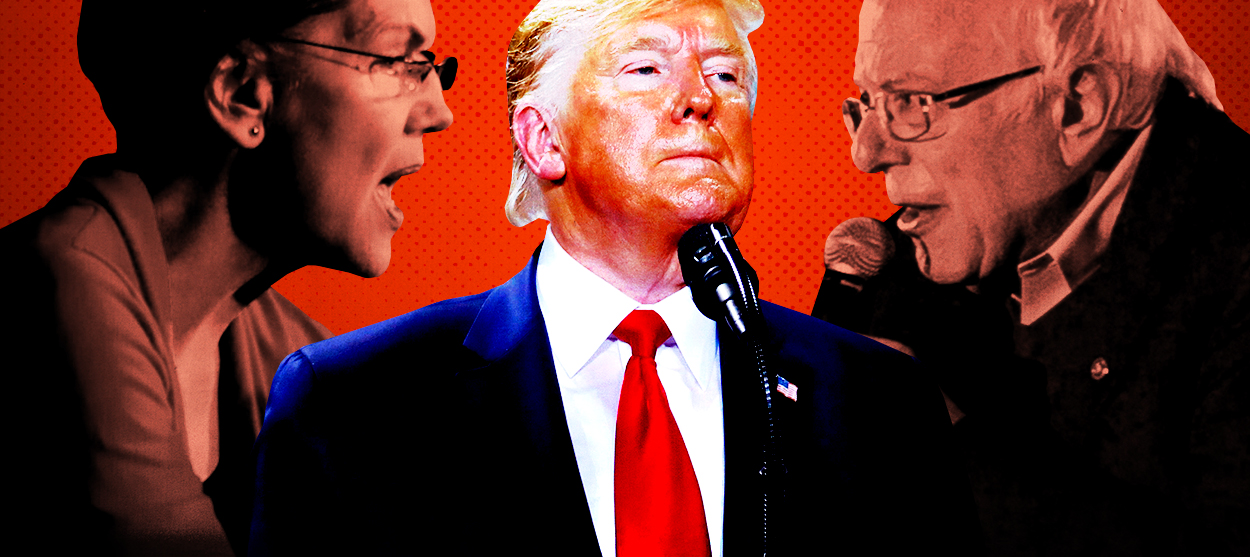Which Democrats can credibly call out Trump's corruption in 2020?
The president's pervasive corruption and reversal on positions like campaign finance should be a gift to his opponent


A free daily email with the biggest news stories of the day – and the best features from TheWeek.com
You are now subscribed
Your newsletter sign-up was successful
There are few issues in America that seem to unite voters like money in politics. The vast majority of Americans believe that political corruption is a major problem that must be confronted for the sake of our democracy. According to one study from a nonpartisan research group at the University of Maryland, three-fourths of Americans — including 66 percent of Republicans — support overturning Citizens United, while 88 percent want to "reduce the influence [that] large campaign donors wield over lawmakers." Pew Research Center has similarly found that nearly 8-in-10 Americans agree that there should be "limits on the amount of money individuals and organizations" can spend on political campaigns. Anyone who has followed this issue closely over the years knows that this is not a new trend.
Political corruption was perhaps the key issue during the 2016 election, and it ironically ended up benefiting Donald Trump, the corrupt billionaire who had previously bragged about buying off politicians (including his Democratic opponent, who he donated to years earlier). One of the major appeals of Trump in 2016 was his supposed ability to self-finance his own campaign, which he claimed made him incorruptible and immune to the influence of lobbyists and corporate interests. "I don't need anybody's money ... I'm using my own money. I'm not using the lobbyists. I'm not using donors. I don't care. I'm really rich," he said (before going on to benefit from more than $300 million dollars from lobbyists and donors).
The Clinton camp ended up raising and spending a few hundred million dollars more than the Trump camp, but it's unclear whether this actually helped, as she was easily characterized as the big-donor candidate who represented the political and economic elite. At one point during her campaign, Clinton defended her fundraising and speaking fees from banks like Goldman Sachs by comparing herself to President Obama, who also raked in cash from Wall Street and corporate America during his first presidential campaign. For progressives who were disappointed with Obama's timid approach to Wall Street after the financial crisis, this was hardly reassuring. In the end, Clinton's big-donor campaign was the perfect foil for Trump's self-financing claims, true or not, and the billionaire managed to convince enough voters that his opponent was a "crook" and that he would take on the country's corrupt elite and fight for the so-called "forgotten men and women."
The Week
Escape your echo chamber. Get the facts behind the news, plus analysis from multiple perspectives.

Sign up for The Week's Free Newsletters
From our morning news briefing to a weekly Good News Newsletter, get the best of The Week delivered directly to your inbox.
From our morning news briefing to a weekly Good News Newsletter, get the best of The Week delivered directly to your inbox.
More than three years later, of course, only the most blinded partisans continue to believe that Trump is going to clean things up in Washington or attempt to reform the corrupt campaign finance system (in fact, both of Trump's Supreme Court nominees are committed defenders of money in politics). The Trump administration is the most corrupt administration in modern history, with numerous investigations and dozens of indictments resulting in convictions of some of the president's closest confidants, not to mention last month's impeachment. This should be more than enough to erode the president's populist persona in 2020, but there's also the fact that Trump is no longer even claiming to self-finance his re-election campaign, and is now eagerly accepting support from wealthy donors and Super PACs. "After shunning Trump in the 2016 GOP primary, the big donor class is warming to him," reported Politico in July, noting that the Trump camp and RNC took in over $100 million for the second quarter, fueled by big donors.
All of this provides ample opportunity for Democrats to take up the mantle of populism and push for political reform in 2020. The president's pervasive corruption and reversal on positions like campaign finance is a gift to Democrats, who don't exactly have to bend over backwards to paint Trump as the corrupt plutocrat that he is. As voting for the Democratic primaries quickly approaches, however, Democrats have to stop and ask themselves what kind of candidate can credibly call out Trump's corruption. A deep cynicism runs through the American electorate, and few people trust politicians who appear even remotely indebted to the donor class. A widely cited New York Times survey, for example, found that 55 percent of Americans believe that elected politicians "promote policies that directly help the people and groups who donated money to their campaigns" most of the time, compared to 30 percent who say "some of the time" and only 9 percent who say rarely (a negligible amount said "never").
To nominate someone like Pete Buttigieg, who actively courts big donors and lures potential contributors with the opportunity to buy influence, according to a recent Axios report, would go a long way towards letting Trump off the hook. Meanwhile, former Vice President Joe Biden, the only candidate to receive even more billionaire donations than Mayor Pete, also lacks credibility when it comes to challenging the power of the donor class. And Trump would easily counter Biden's critique of his corruption by pointing to his son's apparent misdeeds in Ukraine (valid or not).
Of course, these candidates are prepared to rationalize their big-donor funding. Buttigieg, for example, seems to be saying the very opposite of what Trump said in 2016 — namely, that he isn't fabulously rich and therefore has to court big donors and sell access to his campaign. "If I pledge — if I pledge never to be in the company of a progressive Democratic donor, I couldn't be up here," the mayor said at the last Democratic debate, where he defended his fundraising practices after Sen. Elizabeth Warren criticized him for selling access to his time and meeting with donors behind closed doors. Buttigieg has echoed Clinton's 2016 defense of her Wall Street donors, declaring that the same criticisms were leveled against Barack Obama, who "delivered the strongest regulations and accountability that there had been there in a generation." We all know how effective this response was for Clinton three years ago.
A free daily email with the biggest news stories of the day – and the best features from TheWeek.com
The only two top Democratic candidates who seem to have any credibility in taking on the donor class and "draining the swamp," to borrow Trump's popular phrase, are Sen. Bernie Sanders and Warren, who both reject financial support from super-rich donors. While Warren has started to slide over the past month or two, the senator from Vermont is proving once again that it's possible to raise a lot of money without going to rich people who can afford to write a $2,500 check. On Thursday, Sanders announced that his campaign raised $34.5 million in the fourth quarter of 2019, for a total of $96 million from over 5 million donations since February. According to the campaign, Sanders has received "the most donations of any candidate in history at this point in a presidential campaign." The Sanders camp predicts it will have around 50 million individual contributions against Trump, which translates to around $1 billion with an average donation of $18. For his part, Buttigieg announced that he brought in an impressive $24.7 million, with an average donation of about twice that of Sanders (it is unclear whether his "contest" to see who could make the smallest donation helped lower the average, as it was clearly intended to do).
In 2016, Sanders proved that Democrats can raise a lot of money without relying on big donors, while Trump proved that raising the most cash doesn't automatically guarantee you victory. At a time when the overwhelming majority of the electorate is fed up with America's corrupt political system, running a people-powered campaign over a money-powered campaign should be a no-brainer. Soon Democrats will have the opportunity to choose not only their candidate, but the type of campaign they want to run against Trump in 2020.
Want more essential commentary and analysis like this delivered straight to your inbox? Sign up for The Week's "Today's best articles" newsletter here.
Conor Lynch is a freelance journalist living in New York City. He has written for The New Republic, Salon, and Alternet.
-
 The ‘ravenous’ demand for Cornish minerals
The ‘ravenous’ demand for Cornish mineralsUnder the Radar Growing need for critical minerals to power tech has intensified ‘appetite’ for lithium, which could be a ‘huge boon’ for local economy
-
 Why are election experts taking Trump’s midterm threats seriously?
Why are election experts taking Trump’s midterm threats seriously?IN THE SPOTLIGHT As the president muses about polling place deployments and a centralized electoral system aimed at one-party control, lawmakers are taking this administration at its word
-
 ‘Restaurateurs have become millionaires’
‘Restaurateurs have become millionaires’Instant Opinion Opinion, comment and editorials of the day
-
 The billionaires’ wealth tax: a catastrophe for California?
The billionaires’ wealth tax: a catastrophe for California?Talking Point Peter Thiel and Larry Page preparing to change state residency
-
 Bari Weiss’ ‘60 Minutes’ scandal is about more than one report
Bari Weiss’ ‘60 Minutes’ scandal is about more than one reportIN THE SPOTLIGHT By blocking an approved segment on a controversial prison holding US deportees in El Salvador, the editor-in-chief of CBS News has become the main story
-
 Has Zohran Mamdani shown the Democrats how to win again?
Has Zohran Mamdani shown the Democrats how to win again?Today’s Big Question New York City mayoral election touted as victory for left-wing populists but moderate centrist wins elsewhere present more complex path for Democratic Party
-
 Millions turn out for anti-Trump ‘No Kings’ rallies
Millions turn out for anti-Trump ‘No Kings’ ralliesSpeed Read An estimated 7 million people participated, 2 million more than at the first ‘No Kings’ protest in June
-
 Ghislaine Maxwell: angling for a Trump pardon
Ghislaine Maxwell: angling for a Trump pardonTalking Point Convicted sex trafficker's testimony could shed new light on president's links to Jeffrey Epstein
-
 The last words and final moments of 40 presidents
The last words and final moments of 40 presidentsThe Explainer Some are eloquent quotes worthy of the holders of the highest office in the nation, and others... aren't
-
 The JFK files: the truth at last?
The JFK files: the truth at last?In The Spotlight More than 64,000 previously classified documents relating the 1963 assassination of John F. Kennedy have been released by the Trump administration
-
 'Seriously, not literally': how should the world take Donald Trump?
'Seriously, not literally': how should the world take Donald Trump?Today's big question White House rhetoric and reality look likely to become increasingly blurred
